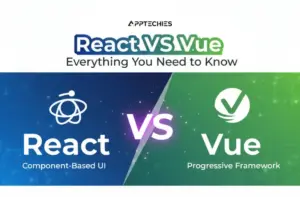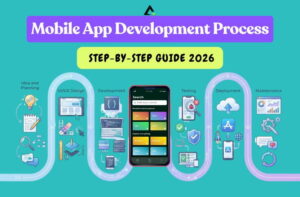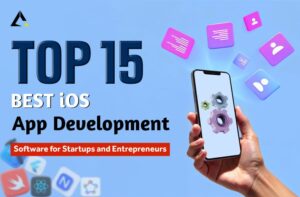
Benefits of AI in Education: How AI is Transforming Learning
The benefits of AI in education are revolutionizing the way knowledge is delivered and received all over the world. From the experiences of personalized study to digital classrooms, Artificial Intelligence in education is changing how students learn, teachers teach, and run institutions. With the integration of AI education software development, learning is more adaptable, data-driven and open to all. If you want to build an AI-powered feature-rich elearning app partnering with a trusted education app development company is the best choice.
According to Grand View Research, the market of AI in education is expected to reach $25.7 billion by 2030, increasing at a CAGR of more than 36%. This growth will be driven by the increasing use of AI solutions for education, e-learning platforms and digital changes in schools and universities. This global expansion reflects the growing importance of Artificial Intelligence in education by providing teachers with intelligent analytics, automation tools and AI chatbots that improve engagement and simplify communication.
AI in the education sector continues to unlock new opportunities as we move toward a more technologically advanced and connected future. It makes the future of learning more inclusive, quicker and smarter. Personalized tutoring, automatic grading systems and generative AI in education are just a few examples of how AI is changing education in the digital age. It is setting the foundation for a future-ready learning ecosystem. In this blog, you will find out the benefits of AI in education, how AI changes learning, and what is the future of AI in education.
Why AI is Becoming Essential in Modern Learning Apps?
AI is becoming a crucial element of modern learning applications in today’s rapidly changing digital age. Because it makes education more personalized, effective and accessible. The use of AI in education helps create learning experiences that are compatible with the needs of each student. AI technology analyzes how students learn, their speed, strength and weaknesses, before tailoring content to them. This not only improves engagement but also ensures better learning outcomes.
This is the future of AI in education, learning applications driven by AI solutions for education are assisting teachers in focusing on creativity and mentorship. While AI handles repetitive tasks as the use of AI technology in education expands globally. Here is why using AI in education apps is a necessity, not an option.
Adaptive Learning at scale
AI algorithms enable applications to dynamically modify content according to individual student learning styles, ensuring that the lessons are still challenging but accessible. This scalability means that thousands of students can gain personalized experiences together.
Predictive Analytics and Insight
AI analyzes user behavior to predict potential learning challenges. Teachers and developers can use this data to improve the content, maximize engagement, and provide quick responses.
Automatic Administrative Assistance:
By eliminating administrative duties, features like performance reporting and automated grading free up monitoring and automated grading. It allows teachers to focus on mentorship and interactive teaching.
Enhanced Student Engagement
As compared to traditional static apps, AI-driven simulation, quiz and interactive activities keep students motivated and make learning more interesting.
Global Adoption and Market Growth
AI-powered education apps are being quickly adopted in regions such as North America, Europe and Asia. AI EDTech investment exceeded $1 billion in 2024, according to HoloniIQ, showing its necessary role in the industry.
Competition Advantages for Developers
By using AI solutions for education, app developers can create smart, flexible platforms that differentiate themselves in a crowded market. It provides better learning opportunities and increases operational effectiveness.
Generative AI-Driven Adaptive Learning
Generative AI makes it possible to create learning exercises, simulations, and quizzes that match each student’s progress and needs. This ensures a more personal approach to education and improves important thinking and problem-solving skills.
Top Pros & Cons of AI in Education
The way EdTech platforms, schools, and colleges are transformed by Artificial Intelligence. While the benefits of using AI in education are unquestionable, it is equally important to consider challenges. Below are the pros and cons of AI in education that highlight both advantages and disadvantages.
Pros of AI in Education
Personalized Education
AI optimizes lessons and study material based on the preferences and progress of each learner, which is one of the key advantages of AI in education.
24/7 Learning Assistance
Through AI chatbots for education, students can get immediate help at any time and from anywhere.
Enhanced Teaching Efficiency
AI improves retention by recommending the right videos, tests or lessons at the right time, aligning education with the future of AI in education and workforce demands.
Improved Accessibility
The use of Artificial Intelligence in education helps students with unique needs and removes language barriers.
Data-Driven Insight
One of the major benefits of using AI in education is accuracy and speed are increased for tasks like feedback and grading.
Cons of AI in Education
High Implementation Costs
To build and maintain AI-powered platforms, large investments are required in technology, software and training, which can be difficult for small institutions.
Data Privacy and Security Risk
A massive amount of student data are collected and examined, increasing concerns for privacy, compliance and ethical use.
Algorithm Bias
AI systems trained on biased data may accidentally give preference to some groups, which may affect learning and evaluation quality.
Over-Dependence on Technology
Relying too much on AI tools might affect the development of critical thinking abilities, creativity and interactions between teachers and students.
Digital Divide
Students in some areas with limited internet access or devices might not be able to take full use of AI-powered educational solutions.
Limited Human Judgment
Although AI can provide insight and automation, it cannot take the place of human empathy, smart decision-making or mentorship, which are crucial in education.
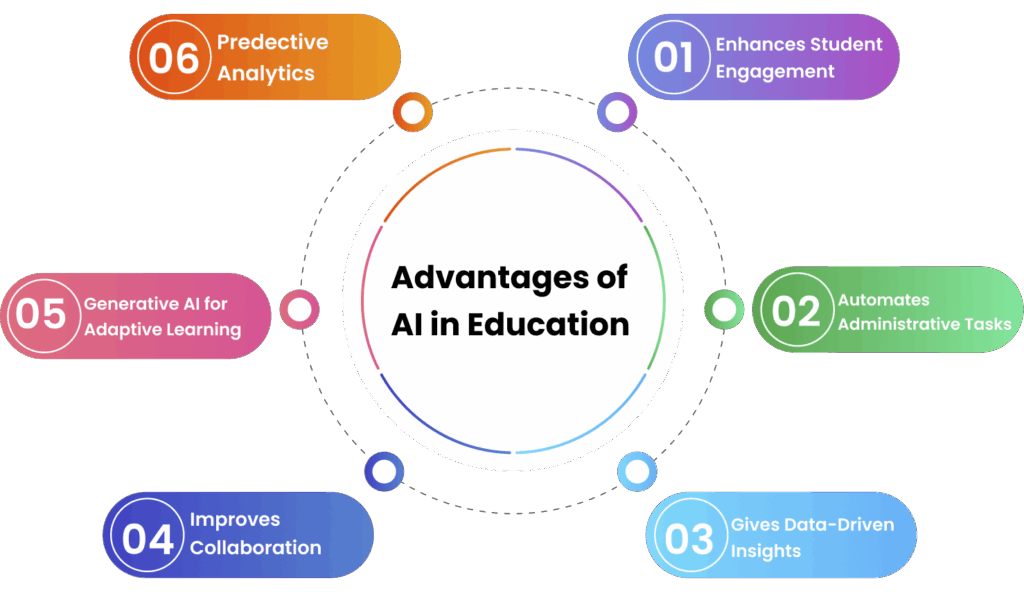
Real-World Examples of AI in Education
Artificial intelligence has completely changed the global education sector, making learning more accessible, personalized and entertaining than ever before. The importance of artificial intelligence in education allows both teachers and students in the education sector, from virtual teachers to smart classrooms. Here are 10 globally popular examples of AI in education that demonstrate how technology is changing learning experiences worldwide.
Duolingo – Personalized Language Learning
Duolingo is the most popular language learning app with more than 500 million users. Duolingo uses AI Technology in education to tailor lessons for each student. By offering immediate feedback and interactive challenges, the platform optimizes the user’s learning speed, strengths and weaknesses. It makes language learning more effective and entertaining.
Coursera – AI-based Course Recommendations
Coursera is one of the largest e-learning platforms. Uses AI for education to recommend courses based on students’ learning preferences and learning history. Millions of students who received help in finding the right educational paths through its recommendation system, which increases user engagement.
Squirrel AI Learning – Adaptive Learning in China
Squirrel AI Learning is an expert in AI education software development, providing millions of students in China with personalized tutoring through advanced algorithms. The platform continuously adjusts lesson difficulty based on real-time performance data, and greatly enhances academic results.
Carnegie Learning – Intelligent Math Tutoring
Carnegie Learning offers customized mathematics training by fusing cognitive science and Artificial Intelligence. Its intelligent teaching system tracks the process of solving the problem of each student and provides tailored feedback, which helps teachers focus on the areas in which students most require assistance.
Brainly – AI Chatbots for Homework Assistance
AI Chatbots are used in education by Brainly, a global learning community, to help students with homework and study-related inquiries. The AI evaluates millions of questions to deliver accurate, clear answers that encourage collaboration and online education.
Microsoft Immersive Reader – Accessibility to All
As an aspect of its AI solutions, Microsoft’s Immersive Reader supports students’ problems with learning, like dyslexia or ADHD, by using text-to-speech and translation tools. It promotes equality by making educational resources accessible to students all over the world.
Content Technologies, Inc.
Content Technologies, Inc. (CTI) uses generative AI in education to create customized digital textbooks and assessments. The platform can automatically design learning content based on a student’s curriculum, the platform can save teachers a great deal of time.
Century Tech- AI-Powered Personalized Learning
Century Tech is an AI education company in the UK that provides customized learning experiences by fusing artificial intelligence and neuroscience. By detecting knowledge gaps and modifying the way content is delivered. The technology assists both students and teachers in making data-driven decisions.
Quizlet – Smart Learning Through AI
With over 60 million monthly users, Quizlet uses an AI algorithm to generate customized study sets, monitor user progress, and suggest educational resources. The AI-powered “Learn Mode” helps students memorize quickly and maintain longer knowledge.
Konitan
Konitan is now a part of Wiley, which uses AI analytics to track student progress and predict learning results. One great example of how AI technology in education improves the efficiency of the class to each student’s needs by gaining insights about individual performance.
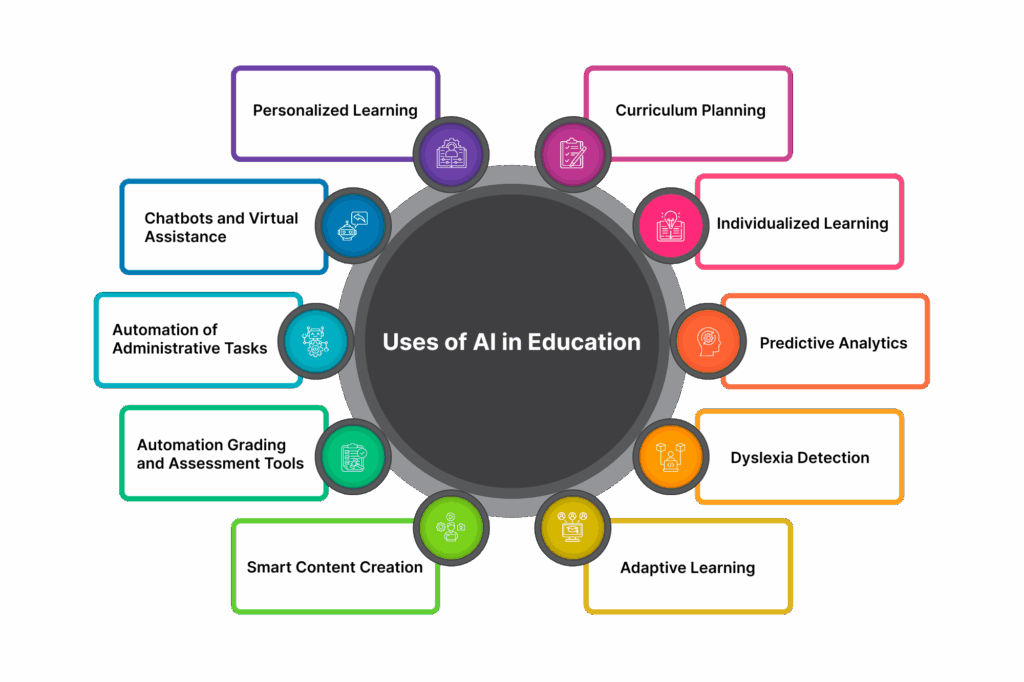
You can read also: How AI is Revolutionizing the Future of Social Media
Why Choose Apptechies As your Education App Development Company for AI Integration
Artificial Intelligence (AI) has become an important force behind the transformation of how teachers and students learn and teach. The success of any AI-driven solution depends on choosing the best elearning app development company is essential. Whether it involves creating smart teaching systems or personalized learning platforms. Apptechies, a trusted mobile app development company, with its cutting-edge, scalable and AI-powered app designed to transform learning experiences worldwide.
Here’s why Apptechies is an ideal partner for an education app development company for AI integration.
Specialization in AI and Mobile Application Development
We at Apptechies are experts in creating AI-powered mobile apps. Our skilled mobile app developers use modern technologies such as machine learning, NLP and generative AI to design applications that provide smart, data-driven and interactive learning environments.
Experience Across Various Industries
Apptechies have provided powerful web and mobile solutions for various industries, including healthcare, logistics, e-commerce and even taxi app development services.
Custom Educational Application Solution
We understand that each learning platform is unique. From AI-Chatbots for education to an intelligent content delivery system, Apptechies creates a customized solution that increases engagement, streamlines administrative work and boosts learning results.
Affordable and Transparent Prices
Understanding the cost to build a mobile app is an important factor for any business or institution. Apptechies provide transparent pricing, guaranteeing high-quality education app development within your budget, without compromising features or creativity.
Cross-Platform Expertise: iOS and Android
Our app development team specializes in both platforms, understands the difference between iOS and Android app performance, design standards and user behavior. This assures that your AI-powered educational software runs smoothly, efficiently and consistently on all devices.
Data Security and Scalability
One of the main concerns with AI in education is data privacy. We create scalable, safe and legal applications that protect students’ information while serving 1000 users at once. Ensuring the reliability of schools, universities and global EDTech startups.
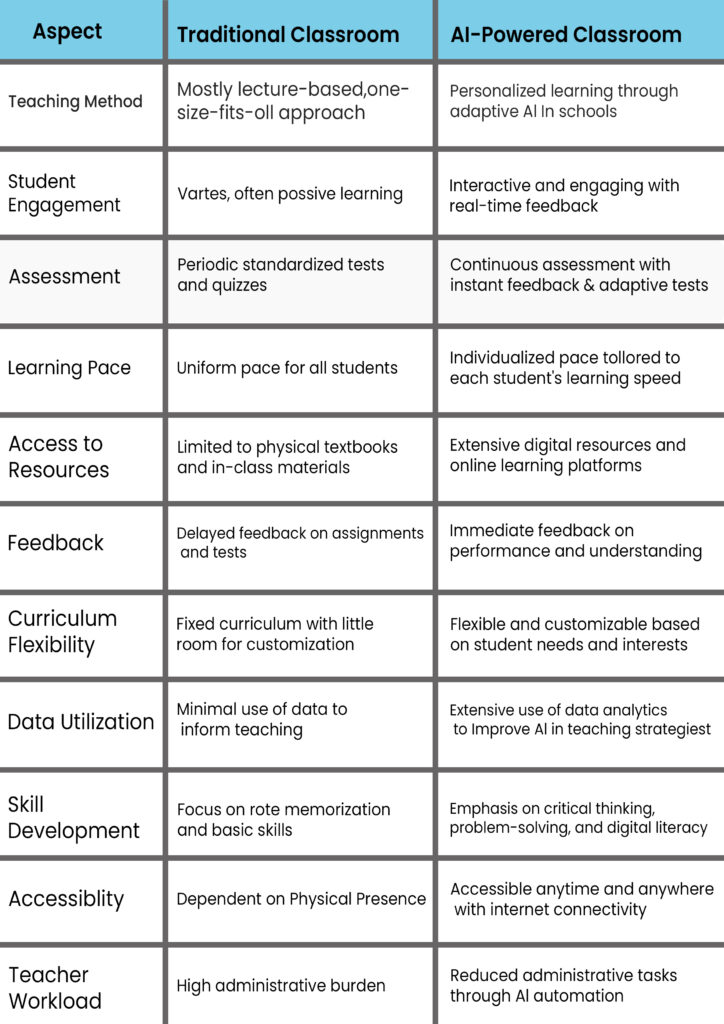
Challenges and Considerations of AI in Education App
While the benefits of using AI in education change the field of learning. There are some key challenges to its successful adoption that educators and developers should consider. Understanding these challenges helps to ensure that the advantages of AI in education are implemented ethically and sustainably.
Data Privacy and Security Risk
Student data is crucial to the tailored learning that AI-powered educational apps provide. But, this raises serious concerns about how this data is collected, stored and protected. Schools and EDTech companies should implement strong cyber security measures, follow data protection laws such as GDPR and CCPA, and maintain transparency to retain trust between students and parents.
Limited AI Knowledge Among Educators
The use of artificial intelligence in education is expanding faster than most teachers can keep up with. Many teachers lack the technical knowledge to effectively use or manage AI-based platforms. Ongoing professional training, awareness campaigns and assistance from AI experts are required to eliminate this difference in knowledge and help educators maximize the potential of AI in education.
Ethical and Fair Use Challenges
The AI systems may unknowingly reflect the biases that are present in their training data, which may affect grading, admission or recommendations. In order to ensure justice and equality, schools must use transparent and impartial AI systems that promote moral guidelines for the use of AI.
Integration with Current Leaching Systems
It is often complicated to merge AI tools with traditional school systems. Adoption may be slow due to the problems of compatibility, limited budget and lack of technical assistance. The transition will go smoothly and successfully if reputable tech companies are partnered with and integration-friendly platforms are used.
Human Resistance to Change
Even with clear advantages of AI in education, resistance from teachers, students or parents is common. There are some fears that AI may replace teachers or reduce human contact. In fact, AI acts as a helpful tool, so that teachers can focus on creativity, mentorship and emotional learning.
By dealing with these challenges carefully, institutions can actually capitalize on the importance of artificial intelligence in education. With ethical methods, data protection and proper training, the future of AI in education promises smarter, more inclusive and more interesting learning experiences for everyone.
You can read also: Top Trending App Ideas for Startups
Future Trends of AI in Education App Development
The Future of AI in education is having a significant impact on the education app development. These developments are making the benefits of AI in education more efficient, personalized and accessible while also improving the educational experiences and simplifying administrative processes.
AI-Enhanced Personalized Learning
AI is making it possible for educational apps to provide a tailored learning experience by examining student data. This personalization authorizes adaptive learning paths and ensures that the content is appropriate for each student’s speed and understanding. Such customization improves commitment and better learning results.
AI on-device for performance and privacy
An emerging trend is the direct integration of AI features into devices to improve app performance and address data privacy concerns. AI processing on devices reduces the delay and ensures that sensitive student data remains safe and provides all a spontaneous user experience.
AI-driven material production
AI is being used more and more in Elearning apps to create dynamic content such as quiz, flashcards and interactive simulations. This automation not only saves time for teachers but also ensures that learning materials are constantly updated and correspond to the current educational standards.
Voice and Natural Language Processing (NLP) Integration
Integrating voice recognition and NLP in educational apps provides more interactive and intuitive user interfaces. Students can get involved with content through voice commands, which can make learning more accessible, especially for people with disabilities or language barriers.
AI-Driven Analytics for Educators
Advanced Analytics run by AI provides deep insight into student performance and behavior. This insight allows teachers to identify learning gaps and modify their teaching strategies accordingly, and promote a more responsible educational environment.
Seamless Integration with Learning Management Systems (LMS)
Modern educational apps are designed to be seamlessly integrated with existing LMS platforms. This interoperability ensures that the AI tool can be used without disturbing the installed workflows, providing a smoother learning experience.
AI-Powered Gamification
ELearning apps are using AI-driven gamification elements to increase the connection. These functions are compatible with personal learning styles and progress by offering personal challenges and rewards that motivate students to participate actively in the learning journey.
Conclusion
AI is already changing learning apps around the world and the benefits of AI in education include personalization, efficiency, increased engagement, accessibility, cost-effectiveness and data-driven insights. But the advantages of AI in education will be maximized when combined with thoughtful policies, strong morality, human monitoring and legitimate access. The role of Artificial Intelligence in mobile app development is very crucial. When we look at the future of AI in education, it is clear that this change is not about changing teachers or old teaching methods, but about increasing and expanding education. If you develop or deploy elearning apps, the importance of artificial intelligence in education is something you cannot ignore.
Frequently Asked Questions
Q. What is the future of AI in Education?
Ans: The future of AI in education seems very promising. AI is predicted to improve learning for students at all levels by making it more personalized, efficient and accessible. From smart teaching systems and virtual classrooms to data-driven insights for educators, AI will play an important role in improving learner performance and engagement. Over the coming years, AI-powered apps are likely to be an essential part of the digital ecosystem of each school and university.
Q. Is AI in Education Safe for Young Children?
Ans: Yes, AI in education can be safe for young students when implemented with responsibility. Developers and teachers should ensure compliance with privacy laws such as GDPR and COPPA to protect children’s personal information. Using safe platforms, parental controls and ethical AI systems to make learning safe and more beneficial for children.
Q. How is Artificial Intelligence used in Education?
Ans: The use of artificial intelligence in education spreads in many areas. AI is used to customize lessons, automate administrative tasks, provide real-time responses and help students learn at their own pace. Making classrooms more effective and inclusive also helps teachers monitor student progress and identify where further support is required.
Q. How is AI currently being used in higher education?
Ans: In higher education, AI changes how institutions work. Universities use AI for automated grading, research support, educational counseling, plagiarism detection and future analysis to improve the success rate of the student. AI-powered learning management systems and virtual assistants also help to make higher education more adaptable and data-driven.
Q. What is the cost of AI Education App Development?
Ans: The cost of AI Education App development varies depending on the complexity, features, design and platform for the app. On average, the cost of a basic AI-powered e-learning app can cost between $25,000 – $60,000, while advanced, feature-rich solutions with analytics, AR/VR integration or multilingual support can range from $80,000 – $200,000 or more. Better quality, scalability and long-term value are guaranteed when working with an experienced educational app development company like Apptechies.
Q. What is the Role of Generative AI in Higher Education?
Ans: Generative AI in higher education helps create personalized learning experiences, create lecture notes, quizzes, research summaries and provide 24/7 educational help through AI tutors. Additionally, it helps to automate administrative duties such as grading and scheduling. Generative AI helps educators and students by increasing creativity, efficiency and student engagement. This highlights the benefits of AI in education and helps to shape its future.
